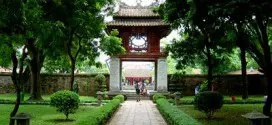Taoism’s journey in Vietnam spans millennia, intertwining with indigenous beliefs to form a rich tapestry of spiritual and cultural expression.
From ancient roots to modern manifestations, Taoist principles have deeply influenced Vietnamese philosophy, religion, literature, and art, reflecting a timeless quest for harmony and balance.
Despite the challenges of modernization, Taoism remains a vital force in Vietnamese society, offering wisdom and solace in an ever-changing world.
Taoism in Vietnam: A Journey Through Time
Taoism, with its profound philosophical principles and spiritual practices, has left an indelible mark on Vietnamese culture and society throughout history. From ancient times to the present day, Taoism has intertwined with the cultural fabric of Vietnam, shaping its religious landscape, influencing its philosophical thought, and leaving a lasting legacy of wisdom and spiritual guidance.
Ancient Roots: Taoism’s Arrival in Vietnam
Taoism found its way to Vietnam through cultural exchanges with China during ancient times. As early as the first millennium BCE, the principles of Taoism began to permeate Vietnamese society, blending with indigenous beliefs and practices. The concept of the Tao, or the Way, resonated deeply with the Vietnamese people, offering a framework for understanding the natural order of the universe and guiding individual conduct.
Taoist Influence on Vietnamese Philosophy and Religion
Throughout Vietnamese history, Taoism has been closely intertwined with Confucianism and Buddhism, forming the three pillars of traditional Vietnamese thought. Taoist concepts such as harmony with nature, the cultivation of inner virtue, and the pursuit of simplicity have deeply influenced Vietnamese philosophical thought and ethical principles.
Taoist Deities and Practices in Vietnamese Folk Religion
In Vietnamese folk religion, Taoist deities play a prominent role alongside indigenous spirits and Buddhist bodhisattvas. Deities such as Đạo Mẫu (the Mother Goddess) and Thánh Gióng (the Saint Giong) are venerated for their protective powers and benevolent influence. Taoist practices, including ancestor worship, divination, and ritual ceremonies, are integrated into the fabric of Vietnamese religious life, reflecting a syncretic blend of Taoism with indigenous beliefs.
Taoism in Vietnamese Literature and Art
Taoist themes and motifs permeate Vietnamese literature, poetry, and art, reflecting the influence of Taoist philosophy on the cultural imagination. Poets and scholars throughout history have drawn inspiration from Taoist principles, incorporating themes of simplicity, spontaneity, and natural beauty into their creative works. Traditional Vietnamese art forms such as lacquer painting, silk embroidery, and watercolor landscapes often depict scenes inspired by Taoist mythology and natural landscapes.
Modern Revival and Preservation Efforts
In contemporary Vietnam, Taoism continues to thrive despite the challenges of modernization and urbanization. Taoist temples and shrines dot the Vietnamese landscape, serving as centers of worship and community gathering. Efforts to preserve and revitalize Taoist traditions are underway, with initiatives to document ancient rituals, conserve sacred sites, and promote cultural heritage awareness.
Taoism in Vietnamese Society Today
While Vietnam undergoes rapid social and economic transformation, Taoism remains a source of spiritual solace and cultural identity for many Vietnamese people. The timeless wisdom of Taoist philosophy continues to resonate with individuals seeking harmony, balance, and inner peace in an increasingly complex world. As Vietnam embraces the challenges of the future, the enduring legacy of Taoism serves as a guiding light, reminding people of the eternal truths of the Tao and the timeless wisdom of the sages.
In conclusion, Taoism in Vietnam represents not only a rich religious tradition but also a profound cultural heritage that has shaped the identity and worldview of the Vietnamese people for millennia. From its ancient roots to its modern manifestations, Taoism continues to inspire and guide individuals on the path to enlightenment and self-realization in Vietnam and beyond.
 Vietnamese Culture and Tradition
Vietnamese Culture and Tradition 

